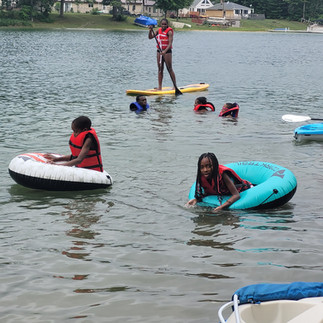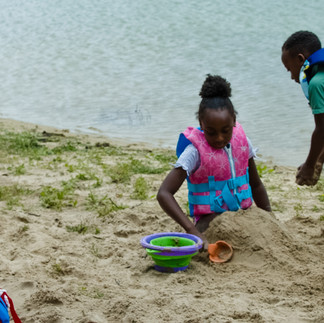Flowing Together: Reflections on the 3rd Annual Great Lakes People of Color Water & Policy Retreat
- Tiana Starks
- Aug 15, 2023
- 3 min read
Updated: Nov 9, 2023
Date: July 24-29, 2023
Location: Great Lakes People of Color Water & Policy Center, Idlewild, Michigan
Introduction
In July, We the People of Detroit (WPD) convened its third annual retreat at the picturesque Great Lakes People of Color Water & Policy Center, nestled in the historically Black resort community of Idlewild, Michigan. This retreat served as a crucial moment for participants to experience renewal, relaxation, reconnection, and recreation while fostering a deeper connection to water.
This retreat is designed to bring together water warriors from across Michigan and Ohio. WPD hosted 60 attendees from five organizations, including Junction Coalition, the Flint Community Water Lab, Alliance for the Great Lakes, the Wisdom Institute, etc.
A key focus of this event was to address the feedback received from youth attendees of the 2022 retreat regarding the balance between programmed activities and leisure time. This adjustment was pivotal, considering the retreat's primary objective of instilling a sense of enjoyment and engagement with water, an opportunity often lacking for many African-American youth.
Overall Retreat Goals
The retreat was designed with several overarching objectives in mind:
Renewal, Relaxation, Reconnection, and Recreation in Nature: Participants were encouraged to rejuvenate their spirits while immersing themselves in the natural beauty of the surroundings, with an emphasis on deepening their relationship with water.
Intergenerational Grounding: The program included grounding exercises that fostered intergenerational connections among attendees, creating a platform for wisdom exchange between elders and youth.
Exploration of the Seven Buckets of Water Justice: Youth social justice leaders were provided with experiences related to and exploring the seven pillars of water justice, known as the "Seven Buckets of Water Justice."
Creation of Youth-Driven Branding and Logo for GL WPC: The retreat also aimed to make progress on the development of youth-driven branding and a logo for the Great Lakes People of Color Water & Policy Center (GL WPC).
The Seven Buckets of Water Justice
The Seven Buckets of Water Justice provided a framework for understanding and addressing water-related issues:
Spirit of Water: Focuses on the spiritual and cultural significance of water.
Water Policies: Examines the policies and regulations governing water access and usage.
Water Storytelling: Explores the power of storytelling to convey the importance of water.
Water Recreation: Promotes engagement with water through recreational activities.
Careers in Water: Highlightes opportunities for careers and involvement in water-related fields.
Scient of Water: Encourages a scientific understanding of water and its properties.
Sociology of Water: Delves into the social aspects of water access and distribution.
Intergenerational Dialogue
One of the retreat's key strengths was providing a safe space for intergenerational conversations. Youth leaders and elders engaged in meaningful discussions to analyze the challenges faced by the African-American community in the context of water justice. Participants collaborated to develop strategies for overcoming these challenges and identifying ways to navigate and leverage the broader water advocacy landscape.
Documentation and Sharing
To preserve valuable insights and ideas generated during the retreat, the WPD videographer documented the lessons, stories, and concepts shared among participants. The WPD team will utilize video clips from this historic gathering to convey the retreat's goals, lessons learned, and key takeaways to a wider audience.
In conclusion, the We the People of Detroit's third annual retreat at the Great Lakes People of Color Water & Policy Center in Idlewild, Michigan, served as a vital platform for fostering a culture of enjoyment, engagement, and advocacy for water justice, particularly among African-American youth leaders. Focusing on the seven buckets of water justice and promoting intergenerational dialogue, this retreat continues to make a meaningful impact on the journey towards equitable water access and policy reform.




























Comments